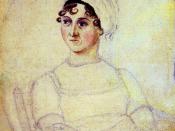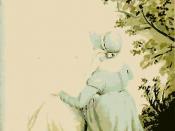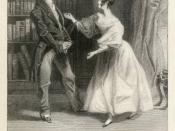- -
19th century England had some serious social problems left over from
the heyday of Royalty and Nobility. One of the most significant of these was
the tendency to marry for money. In this basic equation, a person sought a
spouse based on the dowry receivable and their allowance. This process
went both ways; a beautiful woman might be able to snag a rich husband, or a
charring handsome man could woo a rich young girl. In these marriages,
money was the only consideration. Love was left out, with a feeling that it
would develop as the years went by. In Pride and Prejudice, Jane Austen
comments that marriage in her time is a financial contract, where love is
strictly a matter of chance.
Lady Catherine states the fact that happiness in marriage is strictly a
matter of chance. This holds true in the conception of marriage held in the
novel. All of the marriages in the book formed under the bonds of money
rather than the bonds of love end up unhappy or unsuccessful. The whole
novel outlines attempts to dance around love for the combination of a wealthy
person with an attractive person.
The first line of Pride and Prejudice, "It is a universally acknowledged
fact that a single man in possession of a good fortune must be in want of a
wife", sets the tone for the rest of the novel. We interpret it to mean that a
wealthy man either actively pursues a wife based on his knowledge that no
one would turn down a wealthy suitor, or attractive women use their beauty
to their advantage to attract a rich husband. Confident in his knowledge of
his own wealth and magnificence, Darcy's less than romantic first proposal to
Elizabeth is a good example of the...



Plagiarism detected
The paper is plagiarised from: http://www.dreamessays.com/customessays/Term%20Pap ers/6335.htm
0 out of 0 people found this comment useful.